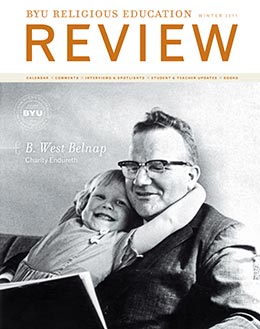R. Devan Jensen (devan_jensen@byu.edu) was executive editor at the Religious Studies Center when this was published.
Brent R. Nordgren (brent_nordgren@byu.edu) was production manager at the Religious Studies Center when this was written.
During the 1960s, students across the nation were searching for truth, and many were questioning established traditions. During this turbulent time, BYU professor B. West Belnap taught a course titled “Your Religious Problems.” Two students in that class were Bruce C. Hafen and Marie Kartchner, who eventually married. Years later, reflecting on that experience, Elder Hafen expressed gratitude that by finding his wife in that class, they found a solution to their “most pressing religious question.”[1]
On the first day of class, Brother Belnap introduced the format of questions and answers by addressing a personal question that had vexed him, “How can I obtain the gift of charity?” Elder Hafen said that he was surprised. “At the time he taught this class, West was just past forty years old and the father of seven children. He was a thoughtful, well-balanced man of sound judgment who had enjoyed an unusually high degree of Church experience for one his age.” Yet Brother Belnap felt he lacked charity. He had “read from the scriptures what charity was, that it reflected the Lord’s very nature, and that God has promised it to ‘all who are true followers of his Son, Jesus Christ’ (Moroni 7:48). A poignancy accompanied his earnest reflection that, despite years of trying to live as pure a daily life as he knew how, the gift had eluded him.”[2] In spite of those misgivings, his colleagues remember West Belnap as a devoted disciple of the Master—a warm, caring peacemaker and an inspired and inspiring teacher and leader.
Childhood
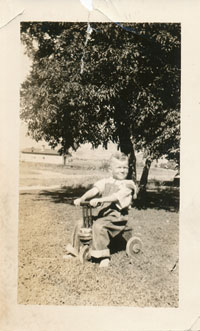
Bryan West Belnap was born March 14, 1921, in Ogden, Utah, to Volney B. Belnap and Rose Marie West. He worked hard on the family farm and enjoyed football, tennis, and other sports. As the second of four living boys, he often acted as a peacemaker, a trait
that later served him well as a BYU administrator. His family recalls, “When West and his brothers were transporting some equipment, Blaine and Bob got into an argument about how much air should be put into the truck tires. While they were arguing, West methodically filled the tires with air. When his brothers asked him how much he had put in, West simply replied, ‘Enough.’”[3]
Money was scarce for the Belnaps during the Depression. When West was in the ninth grade, he learned an important lesson. As he was crossing a river at dusk, he lost his footing and fell in. When he stood up, he noticed that his new glasses had fallen into the river—glasses his father had sacrificed to buy and warned him to be careful not to lose. After searching with no success, he returned to the campsite feeling very discouraged. He went back to search but still could not find them. Finally, he said, “I got on my knees and I prayed as my parents had taught me.”[4] He felt compelled to walk upstream to a spot in the river and place his hands in the water. His hand emerged with the glasses. From that time on, he had faith that God hears and answers even the simplest prayers.
Education
Over the years, West came to delight in studying the scriptures. His desire to learn and live the words of God influenced his daily discipleship and long-term career choice. After graduating from Ogden High in 1939, he studied for two years at Weber College, which at that time was a two-year college. Then he served as a missionary in the Southern States Mission, leaving on Pearl Harbor Day, December 7, 1941. After his mission, he demonstrated his skill as a dynamic speaker. In 1944, he won first place in the Heber J. Grant Oratorical Contest.
While at BYU, he briefly studied sociology. He decided to change majors, rejecting the notion that people “had invented the idea of God to fill a need in their lives.”[5]
Over Christmas break in 1945, West and his friend David Yarn, who was from the Southern States Mission area, asked two coeds, Darlene Howard and Marilyn Stevenson, on a double date to a missionary reunion. West eventually married Darlene and had two sons and five daughters. David married Marilyn, and the two couples enjoyed a lifelong friendship.[6]
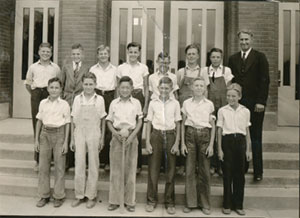
After West studied two years as a graduate student at BYU, Dr. Sidney B. Sperry encouraged him to pursue a PhD at a major university. West was concerned that his testimony would be challenged by the philosophies he would encounter, but his stake patriarch blessed him and “promised him that what he learned at graduate school would not weaken his testimony.” So in August 1948, the Belnaps moved to New York City, and West enrolled at Columbia. To pay their way, the Belnaps became house parents to twenty boys at Woodycrest, a juvenile facility in the Bronx, located just a few blocks from Yankee Stadium. As house parents, they got the boys out of bed and sent them to school and then helped with homework and cared for their other needs. The work continued during the summer as they took the boys to Camp Woodycrest in Bear Mountain State Park.[7]
After three years at Columbia, West earned his MA in philosophical foundations of education and his doctorate in religious education.
Teacher and Leader
Upon graduating, Brother Belnap was hired to teach at BYU, and fellow professor Richard O. Cowan remembers him as being warm, caring, and approachable.[8] West once said to Terry Crapo, a future attorney and law professor, “Terry, we have many people in the Church who have it in their heads, and we have many who have it in their hearts. But we have very, very few who have it in both their heads and their hearts.” He counseled Crapo to develop his head and his heart and use both fully to build the kingdom of God.[9] It is fitting to note that Brother Crapo later served as a counselor to Bishop Belnap in the BYU Eleventh Ward, one of the first wards in the first BYU stake.
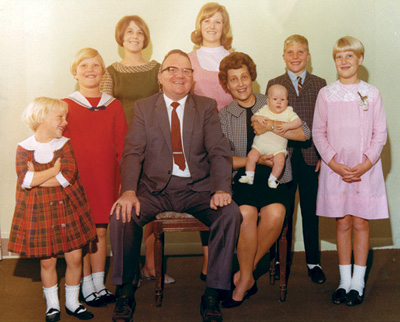
The university asked Belnap to serve in many administrative roles, first as acting chair and later as chair of the Department of Church Organization and Administration. From 1953 to 1958, he served as director of the Undergraduate Division of Religion. The department name was only too accurate because of the divide between conservative and liberal teachers.[10] Though Brother Belnap was not able to placate the more extreme elements, he remained very approachable and respected all points of view.
From 1959 to 1961, he served as chair of the Department of Religious Education, and in 1960 he was called as president of the BYU Second Stake. During the 1961–62 school year, he was appointed acting dean of students. Then on September 1, 1962, he was appointed dean of Religious Instruction. One of his lasting contributions was to establish a set of fundamentals for religion teachers, affirming that a testimony of the gospel was even more indispensable than scholastic achievement. During this period, Belnap served as executive secretary to the All-Church Priesthood Correlation Plan and the Children’s Committee of the All-Church Priesthood Co-ordinating Council, and he helped write the first family home evening manual.[11] Some of his publications are Faith Amid Skepticism, What Think Ye of Christ?, The Presiding Council in the Kingdom of Heaven, and Teaching the Gospel in the Home.
Deepened Discipleship
In his mid-forties, Dean Belnap began to have blinding headaches. Doctors discovered that he had a malignant brain tumor. On May 12 and then again on July 16, 1966, he underwent surgery to remove it. He faced these trials with patience and a sense of humor, joking that because of his hair loss, “he would be well qualified for a ‘Mr. Clean’ commercial. At the same time, however, he acknowledged that his pain was intense. He indicated that his own suffering had helped him better understand the infinite suffering and merciful atonement of our Savior.”[12] On June 8, 1966, he wrote to his mother, “I am most grateful for the fasting and prayers that have been done in my behalf. The one thought that I did want to communicate is that we place our faith completely in the Lord and then wait for Him to decide what is best for us.”
Regarding West’s suffering, Elder Hafen wrote, “West had developed in his early life an earnest desire to follow the Savior as far as it is possible to follow Him. He couldn’t have known where this desire might take him or what it might cost, but he . . . pursued his desire a step at a time, disciplining himself, learning, accepting correction, and making clear to the Lord his commitment to full discipleship, regardless of the cost. . . . Perhaps his excruciating illness somehow gave him access to his heart’s desire—charity. He had wanted to possess what the Savior felt in His love for every human being. To attain that charity, West was willing to give the Lord anything that was his to give, although he knew that, finally, charity is a spiritual gift ‘bestowed’ by the grace of the Atonement ‘upon all who are true followers of his Son, Jesus Christ . . . that when he shall appear we shall be like him’ (Moroni 7:48; italics added).”[13]
Elder Hafen wrote: “Perhaps [such] experiences . . . teach us that those who seek apprenticeship with the Master of mankind must emulate his sacrificial experience to the fullest extent of their personal capacity. Then they might taste His empathy and His charity. For only then are they like him enough to feel his love for others the way he feels it—to love others ‘as I have loved you’ (John 13:34). . . . Perhaps it isn’t possible to have Christ’s charity without submitting to some form of His affliction—not only through physical pain but in many other ways.”[14]
When the cancer persisted, West asked President Lee if he should keep fighting it. President Lee replied: “West, you and I . . . know that life is a very precious thing, . . . every minute of it, even the suffering of it. . . . How do you and I know but what the suffering you’re going through is a refining process by which [the] obedience necessary to exaltation is made up? . . . Live it out to the last day. . . . Who knows but what the experience you are having now will pay dividends greater than all the rest of your life. Live it true to the end, and we’ll bless you and pray to God that pains beyond your endurance will not be permitted by a merciful God.”[15]
In the hospital Ben E. Lewis, BYU administrative vice president and West’s stake president, asked what West had learned. He replied: “I have learned a great principle during the time I have been here. The differences of opinion over points of doctrine are so insignificant, and inconsequential, and fade into oblivion when I contemplate the real values in true friendship. Some of those with whom I have experienced difference of opinion have gone all out to take care of my every need and to show goodwill and love. I see them out of new eyes. They have become my closest friends.” As Ben took West’s hand, the words of Moroni 7:47 flashed through his mind: “Charity is the pure love of Christ, and it endureth forever; and whoso is found possessed of it at the last day, it shall be well with him.”[16] West passed away on January 13, 1967.
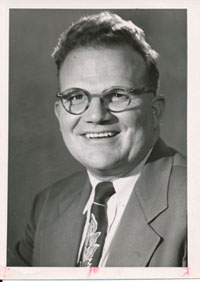
At the funeral, President Lee gave a stirring address. “Never had I seen President Harold B. Lee reduced to tears,” wrote Truman G. Madsen. “In effect, he said that the Brigham Young University had no real justification for existence if its sole contribution was secular training in the arts and sciences. The uniqueness, the spirit, the climax of the University rested in the hands of those who helped students find their bearings in religious understanding and faith. He said that B. West Belnap had been the major leader in quest of that goal.”[17] President Lee then looked at Darlene and the children and said, “He has gone on to something more important. But as we look at this sorrowing little family, our hearts want to cry out, ‘What can possibly be more important than this? And who can do the work as he did it for the university and for the Church?’ He talked further about his experiences with West. Finally he said with a sober calmness, ‘Nevertheless, we know in whom we have trusted. We do not understand, but we do not complain. We have learned to trust the Lord, our God.’”[18] Madsen added, “I will never forget seeing some who before that had been critical and even hostile in attitudes toward the Church, the University, and even to Dean Belnap, come forward, throw their arms around Brother Lee, and unashamedly weep. Their lives have been different ever since. I believe the significance of the life of B. West Belnap has not yet fully dawned upon those of us who are privileged to build upon his foundation.”[19]
It seems fitting that every year Religious Education honors B. West Belnap through an award to a faculty member whose citizenship reflects the highest standards of service to the university and to his or her colleagues.
Notes
[1] Bruce C. Hafen, The Believing Heart: Nurturing the Seed of Faith, 2nd ed. (Salt Lake City: Deseret Book, 1990), 19.
[2] Bruce C. Hafen, A Disciple’s Life: The Biography of Neal A. Maxwell (Salt Lake City: Deseret Book, 2002), 559–60.
[3] “B. West Belnap, a Biographical Sketch,” in They Gladly Taught: Ten BYU Professors (Provo, UT: Brigham Young University, 1988), 3:2.
[4] B. West Belnap, “faith amid Skepticism,” 69–70, in They Gladly Taught, 3:1.
[5] Rose Marie West, “Life of B. West Belnap,” in They Gladly Taught, 3:4.
[6] They Gladly Taught, 3:5–6.
[7] They Gladly Taught, 3:5.
[8] Richard O. Cowan, phone conversation with author, November 12, 2010.
[9] Hafen, Disciple’s Life, 19.
[10] Ben E. Lewis to Darlene Belnap Alder and Kristene Belnap Largey, November 15, 1985, 1, in Tender Recollections of Bryan West Belnap, comp. Kristene Belnap Largey and Darlene Belnap Alder (privately printed, December 1985), 86.
[11] They Gladly Taught, 3:10.
[12] Richard O. Cowan, “A Memory of B. West Belnap,” in Tender Recollections, 88.
[13] Hafen, Disciple’s Life, 560–61.
[14] Hafen, Disciple’s Life, 562.
[15] Quoted in Disciple’s Life, 561.
[16] Ben E. Lewis to Darlene Belnap Alder and Kristene Belnap Largey, November 15, 1985, 2, in Tender Recollections, 87.
[17] Truman G. Madsen, in “A Glimpse of West Belnap,” in Tender Recollections, 79.
[18] Quoted in Hafen, Believing Heart, 20.
[19] Madsen, in “Glimpse of West Belnap,” 79.
